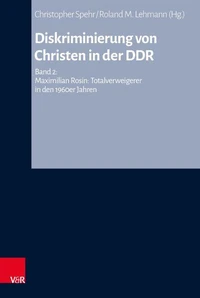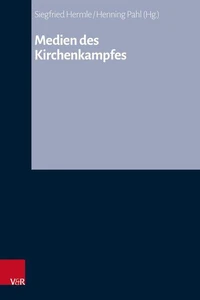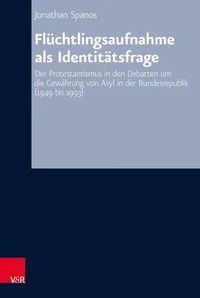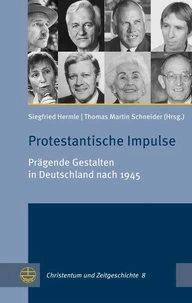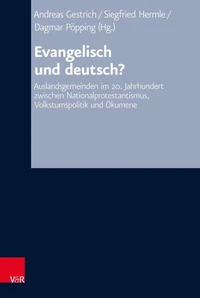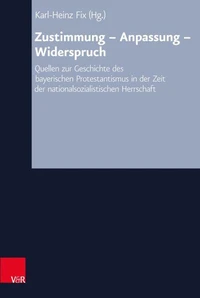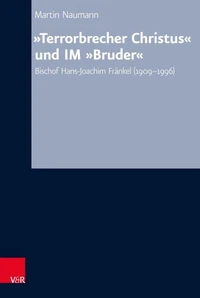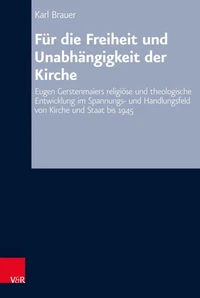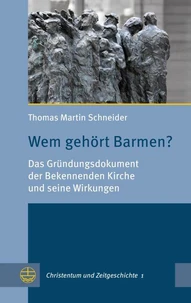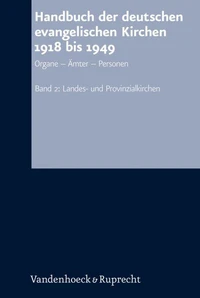Kirchliche Zeitgeschichte_evangelisch. Band 3: Protestantismus in der Nachkriegszeit (1945–1961)
Par : ,Formats :
Disponible dans votre compte client Decitre ou Furet du Nord dès validation de votre commande. Le format PDF est :
- Compatible avec une lecture sur My Vivlio (smartphone, tablette, ordinateur)
- Compatible avec une lecture sur liseuses Vivlio
- Pour les liseuses autres que Vivlio, vous devez utiliser le logiciel Adobe Digital Edition. Non compatible avec la lecture sur les liseuses Kindle, Remarkable et Sony
 , qui est-ce ?
, qui est-ce ?Notre partenaire de plateforme de lecture numérique où vous retrouverez l'ensemble de vos ebooks gratuitement
Pour en savoir plus sur nos ebooks, consultez notre aide en ligne ici
- Nombre de pages256
- FormatPDF
- ISBN978-3-374-06892-0
- EAN9783374068920
- Date de parution05/11/2021
- Protection num.Digital Watermarking
- Taille1 Mo
- Infos supplémentairespdf
- ÉditeurEvangelische Verlagsanstalt
Résumé
Die Geschichte von Kirche und Christentum seit dem Ersten Weltkrieg rückt als Kirchliche Zeitgeschichte immer mehr in den Fokus des akademischen und öffentlichen Interesses. Im Rahmen einer in vier Bänden konzipierten handbuchartigen Gesamtdarstellung der Kirchlichen Zeitgeschichte bietet dieser dritte Band in zehn Kapiteln (u. a. Politik, Theologie, Bildung, Kultur, Diakonie, Judentum) einen Überblick über die Nachkriegszeit.
Entfaltet werden die unterschiedlichen Formen evangelischer Kirchlichkeit und protestantischen Christentums, wie sie sich im Zeichen des wirtschaftlichen Wiederaufbaus in der west- und ostdeutschen Gesellschaft herausbilden. Das von ausgewiesenen Experten höchst anschaulich verfasste Buch bietet eine profunde historische Grundlage und eröffnet Perspektiven für das kirchenhistorische Verstehen des gesamten 20.
Jahrhunderts. Mit Beiträgen von Klaus Fitschen, Karl-Heinz Fix, Norbert Friedrich, Andreas Gestrich, Siegfried Hermle, Claudia Lepp, Harry Oelke, Antje Roggenkamp, Arnulf von Scheliha, Thomas Martin Schneider und Maike Schult. [Contemporary Church History_Protestant, Volume 3: Protestantism in the Postwar Period (1945-1961)] The history of the church and Christianity since World War I seen as contemporary church history is increasingly moving into the focus of academic and public interest.
As part of a four-volume handbook-like survey of contemporary church history, this third volume offers an overview of the postwar period in ten chapters (including politics, theology, education, culture, diaconia, and Judaism). The various forms of Protestant church life and Protestant Christianity, as they emerged in West and East German society under the sign of economic reconstruction, are unfolded. The book, written in a highly descriptive manner by renowned experts, provides a profound historical foundation and opens up perspectives for understanding the church history of the entire 20th century.
Entfaltet werden die unterschiedlichen Formen evangelischer Kirchlichkeit und protestantischen Christentums, wie sie sich im Zeichen des wirtschaftlichen Wiederaufbaus in der west- und ostdeutschen Gesellschaft herausbilden. Das von ausgewiesenen Experten höchst anschaulich verfasste Buch bietet eine profunde historische Grundlage und eröffnet Perspektiven für das kirchenhistorische Verstehen des gesamten 20.
Jahrhunderts. Mit Beiträgen von Klaus Fitschen, Karl-Heinz Fix, Norbert Friedrich, Andreas Gestrich, Siegfried Hermle, Claudia Lepp, Harry Oelke, Antje Roggenkamp, Arnulf von Scheliha, Thomas Martin Schneider und Maike Schult. [Contemporary Church History_Protestant, Volume 3: Protestantism in the Postwar Period (1945-1961)] The history of the church and Christianity since World War I seen as contemporary church history is increasingly moving into the focus of academic and public interest.
As part of a four-volume handbook-like survey of contemporary church history, this third volume offers an overview of the postwar period in ten chapters (including politics, theology, education, culture, diaconia, and Judaism). The various forms of Protestant church life and Protestant Christianity, as they emerged in West and East German society under the sign of economic reconstruction, are unfolded. The book, written in a highly descriptive manner by renowned experts, provides a profound historical foundation and opens up perspectives for understanding the church history of the entire 20th century.
Die Geschichte von Kirche und Christentum seit dem Ersten Weltkrieg rückt als Kirchliche Zeitgeschichte immer mehr in den Fokus des akademischen und öffentlichen Interesses. Im Rahmen einer in vier Bänden konzipierten handbuchartigen Gesamtdarstellung der Kirchlichen Zeitgeschichte bietet dieser dritte Band in zehn Kapiteln (u. a. Politik, Theologie, Bildung, Kultur, Diakonie, Judentum) einen Überblick über die Nachkriegszeit.
Entfaltet werden die unterschiedlichen Formen evangelischer Kirchlichkeit und protestantischen Christentums, wie sie sich im Zeichen des wirtschaftlichen Wiederaufbaus in der west- und ostdeutschen Gesellschaft herausbilden. Das von ausgewiesenen Experten höchst anschaulich verfasste Buch bietet eine profunde historische Grundlage und eröffnet Perspektiven für das kirchenhistorische Verstehen des gesamten 20.
Jahrhunderts. Mit Beiträgen von Klaus Fitschen, Karl-Heinz Fix, Norbert Friedrich, Andreas Gestrich, Siegfried Hermle, Claudia Lepp, Harry Oelke, Antje Roggenkamp, Arnulf von Scheliha, Thomas Martin Schneider und Maike Schult. [Contemporary Church History_Protestant, Volume 3: Protestantism in the Postwar Period (1945-1961)] The history of the church and Christianity since World War I seen as contemporary church history is increasingly moving into the focus of academic and public interest.
As part of a four-volume handbook-like survey of contemporary church history, this third volume offers an overview of the postwar period in ten chapters (including politics, theology, education, culture, diaconia, and Judaism). The various forms of Protestant church life and Protestant Christianity, as they emerged in West and East German society under the sign of economic reconstruction, are unfolded. The book, written in a highly descriptive manner by renowned experts, provides a profound historical foundation and opens up perspectives for understanding the church history of the entire 20th century.
Entfaltet werden die unterschiedlichen Formen evangelischer Kirchlichkeit und protestantischen Christentums, wie sie sich im Zeichen des wirtschaftlichen Wiederaufbaus in der west- und ostdeutschen Gesellschaft herausbilden. Das von ausgewiesenen Experten höchst anschaulich verfasste Buch bietet eine profunde historische Grundlage und eröffnet Perspektiven für das kirchenhistorische Verstehen des gesamten 20.
Jahrhunderts. Mit Beiträgen von Klaus Fitschen, Karl-Heinz Fix, Norbert Friedrich, Andreas Gestrich, Siegfried Hermle, Claudia Lepp, Harry Oelke, Antje Roggenkamp, Arnulf von Scheliha, Thomas Martin Schneider und Maike Schult. [Contemporary Church History_Protestant, Volume 3: Protestantism in the Postwar Period (1945-1961)] The history of the church and Christianity since World War I seen as contemporary church history is increasingly moving into the focus of academic and public interest.
As part of a four-volume handbook-like survey of contemporary church history, this third volume offers an overview of the postwar period in ten chapters (including politics, theology, education, culture, diaconia, and Judaism). The various forms of Protestant church life and Protestant Christianity, as they emerged in West and East German society under the sign of economic reconstruction, are unfolded. The book, written in a highly descriptive manner by renowned experts, provides a profound historical foundation and opens up perspectives for understanding the church history of the entire 20th century.


